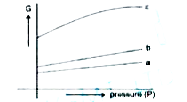Statement -I : There is no change in enthalpy of an ideal gas during compression at constant temperature.
Statement-II: Enthalpy of an ideal gas is a function of temperature and pressure.Solution in Telugu
Statement-I is true, statement-II is true and statement-II is correct explanation for statement-I
Statement-I is true, statement-II is true and statement-II is NOT correct explanation for statement-I
Statement -I is false, statement-II is true.
Statement-I is true, statement-II is false
The correct Answer is:D
Step by step video, text & image solution for Statement -I : There is no change in enthalpy of an ideal gas during compression at constant temperature. Statement-II: Enthalpy of an ideal gas is a function of temperature and pressure. by Chemistry experts to help you in doubts & scoring excellent marks in Class 12 exams.
Topper's Solved these Questions
- BOOK - AAKASH SERIESCHAPTER - CHEMICAL THERMODYNAMICSEXERCISE - Practice Sheet- Exercise-II30videos
CHEMICAL THERMODYNAMICS
- BOOK - AAKASH SERIESCHAPTER - CHEMICAL THERMODYNAMICSEXERCISE - Practice Sheet- Exercise-III30videos
CHEMICAL THERMODYNAMICS
- BOOK - AAKASH SERIESCHAPTER - CHEMICAL THERMODYNAMICSEXERCISE - Lecture Sheet -Exercise-IV16videos
CHEMICAL THERMODYNAMICS
- BOOK - AAKASH SERIESCHAPTER - CHEMICAL KINETICSEXERCISE - Objective Exercise - 4 (Assertion (A) & Reason (R) Type Questions)44videos
CHEMICAL KINETICS
- BOOK - AAKASH SERIESCHAPTER - CHEMISTRY IN EVERY DAY LIFEEXERCISE - PRACTICE EXERCISE29videos
CHEMISTRY IN EVERY DAY LIFE
Similar Questions
Assertion: Under adiabatic free expansion, (dUdV)T is +ve when attractive forces are dominant between gas molecules [U,V,T respresent internal energy, volume and temperature of gas respectively]
Reason: Internal energy is a state function.03:50View SolutionThe following curve represents the variation of Gibbs function 'G' with pressure at constant temperature. Correct match of given plots with the physical state of a substance is
 02:04View Solution
02:04View SolutionFor a reaction R1,ΔG=xKJmol−1. For a reaction R2,ΔG=yKJmol−1. Reaction R1 is non-spontaneous but along with R2 it is spontaneous. This means that
06:20View Solution(A) Spontaneous reaction may be slow or fast.
(R ) Spontaneous nature deals with feasibility of the reaction but not rate.02:27View SolutionAnti allergy drugs are
01:26View SolutionStatement: In the case of an ideal gas the changes in Gibbs and Helmholtz free energies are equal to each other ( DeltaG=DeltaA ) for isothermal reversible process. Explanation: There is no change in internal energies and enthalpies for ideal gas at constant temperature.
01:50View SolutionThere is no change in internal energy for an ideal gas at constant temperature.
Internal energy of an ideal gas is a function of temperature only.02:47View SolutionStatement-1: A real gas behaves as an ideal gas at high temperature and low pressure .
Statement-2: Liquid state of an ideal gas is impossible.View SolutionThese question consists of two statements each, printed as Statement-I and Statement-II . While answering
these Question you are required to choose any one of the following four responses.
Statement-I : There is no change in enthalpy of an ideal gas during compression at constant temperature .
Statement -II : Enthalpy of an ideal gas is a function of temperature and pressure.View SolutionAn ideal gas at constant temperature and pressure expands, then its
02:29View SolutionStatement-1.During isothermal expansion of an ideal gas, there is no change in the internal energy. Statement -2.During isothermal expansion of an ideal gas , as temperature remains constant, no heat enters or leaves the system.
02:34View SolutionIf the pressure of an ideal gas at constant volume is decreased by 20% then the percentage change in temperature will be
01:06View SolutionStatement-1 : There is no change in enthalpy of an ideal gas during compression at constant temperautre. Statement-II : Enthalpy of an ideal gas is a function of temperature and pressure.
02:38View SolutionStatement-1 : There is no change in enthalpy of an ideal gas during compression at constant pressure.
Statement-II : Enthalpy of an ideal gas is a function of temperature .03:07View SolutionStatement I : Internal energy of an ideal gas does not depends on volume of the gas. Statement II : This is because internal energy of an ideal gas depends on temperature of the gas.
02:24View Solution

